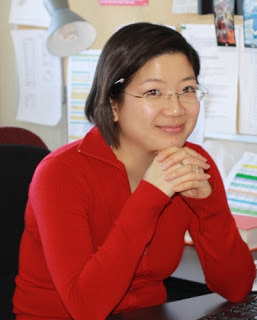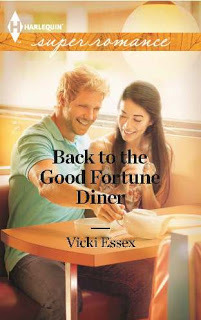Interview With Vicki Essex - Author of Back To The Good Fortune Diner and Smart Bitch Sarah's January Book Club Selection
Oh man - talk about great timing! Not only do we have a fantastic interview with Vicki Essex whose Jan book Back to the Good Fortune Diner is Smart Bitch Sarah's January Book Club selection - but she is giving away three copies - digital or print to one lucky commenter. The winners will be selected on Wednesday - just include your email address on your comment.


How have you adjusted to the longer Superromance word count? was it a tough learning process? Or are you better with a longer word count?
At first, I was worried. An extra 20,000 words was a lot of writing. But then I discovered the magic of secondary plots. In the case of Back to the Good Fortune Diner, I got to approach the conflicts my main characters, Tiffany and Chris, faced from a different angle through Tiffany’s brother, Daniel. I actually enjoy secondary plots for that reason. You can explore different aspects of a theme through other characters’ perspectives. Or you can further complicate the main plot with more involved external pressures. It was challenging and a little scary to have to write 25% more, but that’s probably just because there’s so much more you can say in that space.
You have a bi-racial couple in this book! Was that something you've wanted to include in your romances? Did your editor embrace it?
I was set on writing a character of Chinese descent when I started writing. Being Chinese Canadian myself, it was hard to find romances featuring characters with my background. I was hesitant at first—I wasn’t sure it would sell. The simple fact is, you don’t see a lot of diversity in romances. But the more I explored Tiffany’s characterization, the more I realized there was nothing about her experiences that wasn’t like anyone else’s. Many of us grow up with parental disapproval, a sense of not belonging. The thing that made this story “the same, but different” was that Tiffany had the additional challenge of growing up as a minority in a small town in America, and that’s something she has to come to grips with.
After we worked on it together, my editor fully embraced my story. The important thing to understand about a good romance—and particularly, Harlequin Superromance books—is that root of the romantic conflict has to be embedded in the characterization. Back to the Good Fortune Diner does delve into the challenges of interracial relationships, but the main conflict deals with Tiffany’s absolute belief that moving back to the city is vital to her success, while Chris’s life is on the farm. The romantic conflict is tied to who the hero and heroine are, rather than what they are. This was important in building the story because interracial relationships aren’t as taboo as they were twenty or thirty years ago. Race does still play a factor, of course, and it was important that I touched on that, as well.
How much have you learned between your first book and your second book?
Craft wise, I learned a lot. Victoria Curran, who was my editor for my first book, Her Son’s Hero, taught me a lot about simplifying, resisting the urge to explain, showing and not telling. Megan Long, my editor for Back to the Good Fortune Diner, really helped me grasp the idea that story happens when choices lead to unexpected consequences.
What's next?
I’m working on another book featuring mixed martial arts, based in the same world as Her Son’s Hero. It stars Kyle Peters, a wrestling and MMA coach, training a female MMA fighter bent on going pro against the wishes of her family. I’m hoping to go back to Everville at some point, as well—there are a lot of stories to tell in a growing, evolving community.
Vicki’s giving away three copies of her latest book, Back to the Good Fortune Diner. Leave a comment below and she’ll randomly draw a winner of a hard copy or ebook version of her book.
Vicki Essex is an author for Harlequin Superromance. Back to the Good Fortune Diner is her second book. For more information, visit www.vickiessex.com. You can also find her on Facebook at www.facebook.com/vickiessexauthor and on Twitter @vickiessex.


How have you adjusted to the longer Superromance word count? was it a tough learning process? Or are you better with a longer word count?
At first, I was worried. An extra 20,000 words was a lot of writing. But then I discovered the magic of secondary plots. In the case of Back to the Good Fortune Diner, I got to approach the conflicts my main characters, Tiffany and Chris, faced from a different angle through Tiffany’s brother, Daniel. I actually enjoy secondary plots for that reason. You can explore different aspects of a theme through other characters’ perspectives. Or you can further complicate the main plot with more involved external pressures. It was challenging and a little scary to have to write 25% more, but that’s probably just because there’s so much more you can say in that space.
You have a bi-racial couple in this book! Was that something you've wanted to include in your romances? Did your editor embrace it?
I was set on writing a character of Chinese descent when I started writing. Being Chinese Canadian myself, it was hard to find romances featuring characters with my background. I was hesitant at first—I wasn’t sure it would sell. The simple fact is, you don’t see a lot of diversity in romances. But the more I explored Tiffany’s characterization, the more I realized there was nothing about her experiences that wasn’t like anyone else’s. Many of us grow up with parental disapproval, a sense of not belonging. The thing that made this story “the same, but different” was that Tiffany had the additional challenge of growing up as a minority in a small town in America, and that’s something she has to come to grips with.
After we worked on it together, my editor fully embraced my story. The important thing to understand about a good romance—and particularly, Harlequin Superromance books—is that root of the romantic conflict has to be embedded in the characterization. Back to the Good Fortune Diner does delve into the challenges of interracial relationships, but the main conflict deals with Tiffany’s absolute belief that moving back to the city is vital to her success, while Chris’s life is on the farm. The romantic conflict is tied to who the hero and heroine are, rather than what they are. This was important in building the story because interracial relationships aren’t as taboo as they were twenty or thirty years ago. Race does still play a factor, of course, and it was important that I touched on that, as well.
How much have you learned between your first book and your second book?
Craft wise, I learned a lot. Victoria Curran, who was my editor for my first book, Her Son’s Hero, taught me a lot about simplifying, resisting the urge to explain, showing and not telling. Megan Long, my editor for Back to the Good Fortune Diner, really helped me grasp the idea that story happens when choices lead to unexpected consequences.
What's next?
I’m working on another book featuring mixed martial arts, based in the same world as Her Son’s Hero. It stars Kyle Peters, a wrestling and MMA coach, training a female MMA fighter bent on going pro against the wishes of her family. I’m hoping to go back to Everville at some point, as well—there are a lot of stories to tell in a growing, evolving community.
Vicki’s giving away three copies of her latest book, Back to the Good Fortune Diner. Leave a comment below and she’ll randomly draw a winner of a hard copy or ebook version of her book.
Vicki Essex is an author for Harlequin Superromance. Back to the Good Fortune Diner is her second book. For more information, visit www.vickiessex.com. You can also find her on Facebook at www.facebook.com/vickiessexauthor and on Twitter @vickiessex.
Published on January 07, 2013 06:06
No comments have been added yet.



